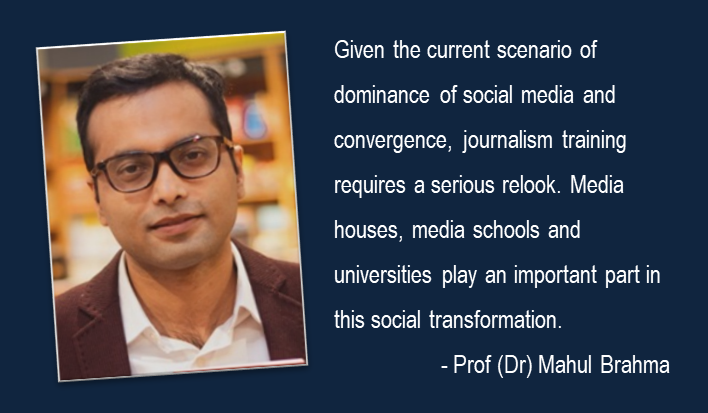While the economy is becoming more and more dependent on platforms, media or journalism, on the other hand, is moving towards platform-agnosticity and convergence. Today, news is consumed across multiple formats, that too simultaneously. Imagine this: you are on your way to office, reading the morning paper (a habit localised to a certain demography), and simultaneously in your mobile news alerts pop up and the FM in your car is constantly sharing the news updates between songs. Here, news is consumed across platforms – print, mobile and radio. We are dealing with an overload of information and so everyone of us have become information managers. But that story is for the another day. The same journalist who works for a print media has to do the following besides writing the story and submitting to the Editor – tweet it, write it for the publication’s portal (may be in a more elaborate format with visuals and charts, and then give byte to the media’s news channel. The same story is packaged across various platforms and journalists today cannot really label themselves as print or electronic or digital. Welcome to the age of convergent journalism.
News consumption has evolved and converged in three distinct evolutionary phases of its consumers — GenX, GenY and GenZ. Reading news or rather consuming it has increased in an evolved mobile format (pun intended), be it “in shorts”, “in alerts” or “in social media”.
Challenges and way forward:
The challenges plaguing the media today, especially with the onset of social media becoming the primary source of news for GenY and GenZ, are fake news, post-truth, paid news and absence of a viable revenue model of media companies resulting in an overt dependence on the first three. The post-truth phenomenon needs to be elaborated a bit. It creates a situation in which belief systems and emotions become more important than objective facts. In such a scenario, it is difficult to ascertain the difference between news and propaganda.
Keeping pace with the platform-agnosticity and convergence of news and the modified form of challenges due to social media, media studies and journalism have to evolve. The teachings of future journalists and media professionals need to include the following:
- Focus on Ethics: While anybody can be a journalist and one didn’t require any specific education to be a journalist until very recently, contemporary circumstances demand a dedicated media education for aspiring journalists. The advent of newer technologies and the growing demands of the profession has made journalism training compulsory. While imparting training on journalism, media schools and universities need to deliver dedicated modules on journalistic ethics. The students need to be sensitised to the larger purpose of the press and rightfully so.
- Alternative Media Platforms and Media Entrepreneurship: In the current context, it is critically important to create a dedicated space for the alternative media platforms. Naturally, creating independent ventures is the need of the hour. The same can’t happen unless aspiring journalists are taught and inspired to become media entrepreneurs. A combination of financial viability and social enterprising is required.
- Agility and Innovation Critical: Given the changing trends of the industry, the aspiring journalists need to emphasize on developing innovative practices to again draw the target audience. There is a need to become agility so as to seamlessly move across platforms and be adept at packaging news across media. This is possible only when they understand the intricacies of news as well as of the profession. Technology remains the backbone.
- Focus on Research: At a time when social media- and Google-based research has become a bane in journalism, aspiring journalists need to stress on real research before creating their stories. The theoretical and methodical approaches of research can only be taught at a media school or a university. This is one of the most important reasons as to why media education is extremely important for aspiring and young journalists.
Given the current scenario of dominance of social media and convergence, journalism training requires a serious relook. The media houses, media schools and universities need to step up and play an important part in this social transformation.
The times they are a-changin’.
The views and opinions published here belong to the author and do not necessarily reflect the views and opinions of the publisher.



Be the first to comment on "Evolution of media studies in the age of platform-agnostic convergent journalism"